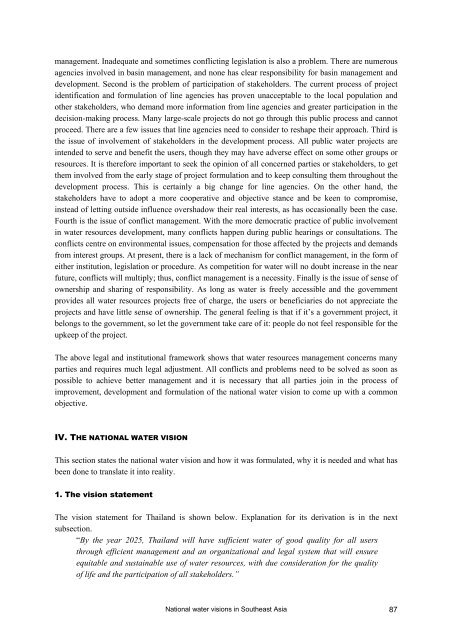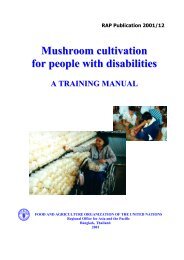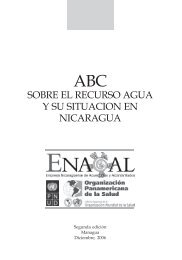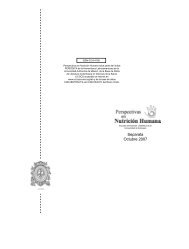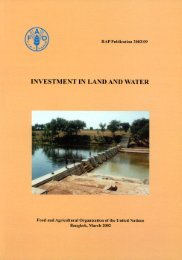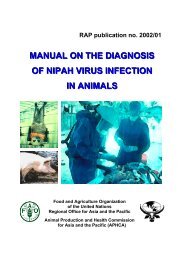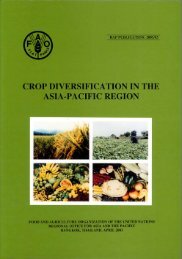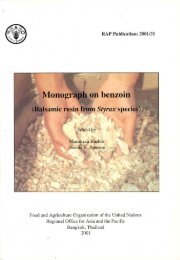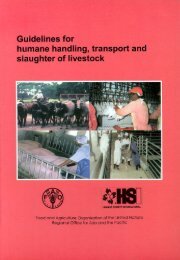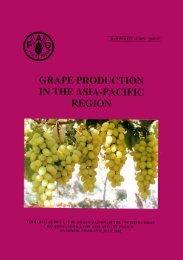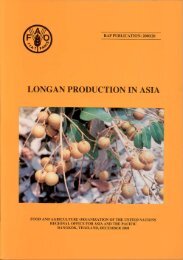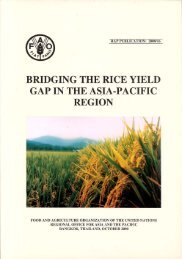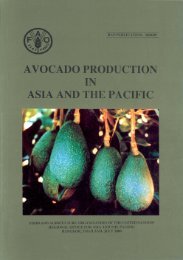The FAO-ESCAP pilot project on national water visions. From vision ...
The FAO-ESCAP pilot project on national water visions. From vision ...
The FAO-ESCAP pilot project on national water visions. From vision ...
Create successful ePaper yourself
Turn your PDF publications into a flip-book with our unique Google optimized e-Paper software.
management. Inadequate and sometimes c<strong>on</strong>flicting legislati<strong>on</strong> is also a problem. <str<strong>on</strong>g>The</str<strong>on</strong>g>re are numerous<br />
agencies involved in basin management, and n<strong>on</strong>e has clear resp<strong>on</strong>sibility for basin management and<br />
development. Sec<strong>on</strong>d is the problem of participati<strong>on</strong> of stakeholders. <str<strong>on</strong>g>The</str<strong>on</strong>g> current process of <str<strong>on</strong>g>project</str<strong>on</strong>g><br />
identificati<strong>on</strong> and formulati<strong>on</strong> of line agencies has proven unacceptable to the local populati<strong>on</strong> and<br />
other stakeholders, who demand more informati<strong>on</strong> from line agencies and greater participati<strong>on</strong> in the<br />
decisi<strong>on</strong>-making process. Many large-scale <str<strong>on</strong>g>project</str<strong>on</strong>g>s do not go through this public process and cannot<br />
proceed. <str<strong>on</strong>g>The</str<strong>on</strong>g>re are a few issues that line agencies need to c<strong>on</strong>sider to reshape their approach. Third is<br />
the issue of involvement of stakeholders in the development process. All public <strong>water</strong> <str<strong>on</strong>g>project</str<strong>on</strong>g>s are<br />
intended to serve and benefit the users, though they may have adverse effect <strong>on</strong> some other groups or<br />
resources. It is therefore important to seek the opini<strong>on</strong> of all c<strong>on</strong>cerned parties or stakeholders, to get<br />
them involved from the early stage of <str<strong>on</strong>g>project</str<strong>on</strong>g> formulati<strong>on</strong> and to keep c<strong>on</strong>sulting them throughout the<br />
development process. This is certainly a big change for line agencies. On the other hand, the<br />
stakeholders have to adopt a more cooperative and objective stance and be keen to compromise,<br />
instead of letting outside influence overshadow their real interests, as has occasi<strong>on</strong>ally been the case.<br />
Fourth is the issue of c<strong>on</strong>flict management. With the more democratic practice of public involvement<br />
in <strong>water</strong> resources development, many c<strong>on</strong>flicts happen during public hearings or c<strong>on</strong>sultati<strong>on</strong>s. <str<strong>on</strong>g>The</str<strong>on</strong>g><br />
c<strong>on</strong>flicts centre <strong>on</strong> envir<strong>on</strong>mental issues, compensati<strong>on</strong> for those affected by the <str<strong>on</strong>g>project</str<strong>on</strong>g>s and demands<br />
from interest groups. At present, there is a lack of mechanism for c<strong>on</strong>flict management, in the form of<br />
either instituti<strong>on</strong>, legislati<strong>on</strong> or procedure. As competiti<strong>on</strong> for <strong>water</strong> will no doubt increase in the near<br />
future, c<strong>on</strong>flicts will multiply; thus, c<strong>on</strong>flict management is a necessity. Finally is the issue of sense of<br />
ownership and sharing of resp<strong>on</strong>sibility. As l<strong>on</strong>g as <strong>water</strong> is freely accessible and the government<br />
provides all <strong>water</strong> resources <str<strong>on</strong>g>project</str<strong>on</strong>g>s free of charge, the users or beneficiaries do not appreciate the<br />
<str<strong>on</strong>g>project</str<strong>on</strong>g>s and have little sense of ownership. <str<strong>on</strong>g>The</str<strong>on</strong>g> general feeling is that if it’s a government <str<strong>on</strong>g>project</str<strong>on</strong>g>, it<br />
bel<strong>on</strong>gs to the government, so let the government take care of it: people do not feel resp<strong>on</strong>sible for the<br />
upkeep of the <str<strong>on</strong>g>project</str<strong>on</strong>g>.<br />
<str<strong>on</strong>g>The</str<strong>on</strong>g> above legal and instituti<strong>on</strong>al framework shows that <strong>water</strong> resources management c<strong>on</strong>cerns many<br />
parties and requires much legal adjustment. All c<strong>on</strong>flicts and problems need to be solved as so<strong>on</strong> as<br />
possible to achieve better management and it is necessary that all parties join in the process of<br />
improvement, development and formulati<strong>on</strong> of the nati<strong>on</strong>al <strong>water</strong> visi<strong>on</strong> to come up with a comm<strong>on</strong><br />
objective.<br />
IV. THE NATIONAL WATER VISION<br />
This secti<strong>on</strong> states the nati<strong>on</strong>al <strong>water</strong> visi<strong>on</strong> and how it was formulated, why it is needed and what has<br />
been d<strong>on</strong>e to translate it into reality.<br />
1. <str<strong>on</strong>g>The</str<strong>on</strong>g> visi<strong>on</strong> statement<br />
<str<strong>on</strong>g>The</str<strong>on</strong>g> visi<strong>on</strong> statement for Thailand is shown below. Explanati<strong>on</strong> for its derivati<strong>on</strong> is in the next<br />
subsecti<strong>on</strong>.<br />
“By the year 2025, Thailand will have sufficient <strong>water</strong> of good quality for all users<br />
through efficient management and an organizati<strong>on</strong>al and legal system that will ensure<br />
equitable and sustainable use of <strong>water</strong> resources, with due c<strong>on</strong>siderati<strong>on</strong> for the quality<br />
of life and the participati<strong>on</strong> of all stakeholders.”<br />
Nati<strong>on</strong>al <strong>water</strong> visi<strong>on</strong>s in Southeast Asia 87


